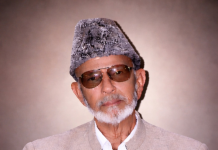By Qamar Bashir
If I were to ask you to name the country that hosts one of the largest Islamic research institutes in the world, an Islamic institute housing over 50,000 books on Islam, your mind might naturally scan through Muslim-majority countries or even Western nations with significant Islamic scholarship. But what if I told you that this remarkable center isn’t in any of those places, but rather in our iron brother, China?
Yes, you read that right. In China, there’s an Islamic institute that boasts a digital library with hundreds of workstations for students, state-of-the-art hostels that accommodate over 500 students at a time, and a university that provides a generous stipend to its students along with guaranteed job placement. This university also has prayer halls equipped with hot and cold water year-round, and a mosque capable of hosting hundreds of Muslims for their five daily prayers in complete freedom and security. It’s a place where the pursuit of Islamic knowledge is nurtured with the utmost care and respect.
I recently spent three days in Urumqi, a city once known as a hotbed of unrest in China. This was my second visit to this north western city after a gap of ten years, and the transformation I witnessed was nothing short of remarkable. Unlike Pakistan, where most cities—save for a few exceptions—seem to have deteriorated over time, Urumqi has evolved into something entirely different.
Ten years ago, Urumqi had the feel of a small town with a rudimentary industrial base. The streets were sparsely populated with cars, and the Grand Bazaar had the appearance of something akin to our own Raja Bazaar. But today, Urumqi is a city reborn. It now boasts an IT park, Innovative Development Corridor of Urumqi Economic and Development Zone, Software Park, Taishan Cloud Computing Industry Base and Green Valley Scientific Innovation Town where leading Chinese and international companies have established their regional headquarters, research and innovation centers, manufacturing plants, and import-export hubs providing jobs of hundreds and thousands of local youths.
I had the unique experience of wandering through the Grand Bazaar in Urumqi, which has undergone a remarkable transformation in recent years. What was once a traditional market is now a state-of-the-art bazaar, offering every food, fruit, and sweet delicacy imaginable. The atmosphere was vibrant, with dance performances, live music, and cultural displays adding a festive touch to the bustling market.
One of the most striking changes was the shift in security measures. Instead of a heavy presence in the bazaar itself, security has been moved to control rooms, allowing people to enjoy a sense of freedom and ease as they explore. Unlike my visit twelve years ago, when only a few faces reflected prosperity, now you would be hard-pressed to find anyone who appeared to be in poverty or distress.
The cultural experience at Xinjiang Art Theatre was nothing short of overwhelming. Tall, beautifully dressed girls with bright, glittering smiles, along with young boys and handsome men, danced to traditional Muslim folk tunes. Their graceful dance steps and the melodious music filled the entire atmosphere with a sense of magic and celebration, making the experience truly unforgettable.
I also had the opportunity to visit Yinning, another city in Xinjiang, which has developed into a bustling commercial and industrial complex along the Kazakhstan border, right on the Euro rail route. Here, towering high-rise buildings and shopping complexes have sprung up, where Chinese and Kazakh citizens engage in frantic shopping sprees. The complex also features numerous food courts and even a 5D cinema. We watched a movie that almost physically transported us across the Euro Triangle, making half the journey feel incredibly real.
With substantial investment, the government has transformed the Grand Bazaar of Yining into a vibrant cultural hub. Beautifully decorated horse-drawn buggies now ferry delighted tourists through the artistically adorned bazaar and its surrounding streets. The houses in the vicinity of the bazaar have been converted into elegant guest and rest houses, where tourists can immerse themselves in the traditional lifestyle, experience local cooking, and savor delicious, mouthwatering home-cooked delicacies, along with homegrown fruits and vegetables. The out-of-this-world hospitality provided here not only offers tourists a unique cultural experience but has also given local households a decent livelihood. This innovative approach has successfully blended tourism with cultural preservation, benefiting both the visitors and the community.
The once poor, rustic, and rugged shepherds have been provided with excellent homes at just 20% of the cost, payable through easy installments. They have also been equipped with modern skills in cattle and sheep breeding, as well as the production of high-quality dairy products. Additionally, they have been trained in modern agricultural techniques, enabling them to achieve a decent living and sustainable higher income. This initiative has significantly improved their quality of life and economic prospects.
This is China’s five prong approach to counter extremism and terrorism from its soil. First, China linked Xinjiang with the nation’s main trade routes, integrating the region more closely with the rest of the country and boosting economic opportunities and providing thousands of high-quality jobs to the indigenous population.
Second, China revolutionized agriculture in Xinjiang by replacing primitive farming methods with ultra-modern techniques. This not only increased productivity but also improved the quality of life for farmers, reducing economic disparity and fostering stability.
Third, the government made significant investments in religious education, promoting it on modern footings. Religious schools and mosques received increased funding and state protection, which not only preserved religious practices but also modernized them, creating an environment where faith and progress could coexist.
Fourth, China passed numerous laws and regulations coupled with speedy justice aimed at narrowing the space for terrorism and extremism.
Finally, China made a concerted effort to reduce economic and financial disparities between Muslims and non-Muslims. The government valued and promoted Muslim social and cultural values, embracing them as an integral part of China’s cultural and social fabric fostering a sense of unity and belonging among its Muslim population.
Through these coordinated efforts, China has successfully transformed Xinjiang from a region plagued by unrest into one characterized by stability, prosperity, and cultural pride. This model, rooted in economic development, education, legal reform, and cultural integration, offers valuable lessons in how to address the complex challenges of extremism and terrorism.
However, when we compare China’s strategic interventions with our own efforts in Pakistan’s restive regions of Balochistan and the erstwhile FATA, we are met with a stark and, frankly, embarrassing contrast.
In these regions, we have largely relied on kinetic power, failing to complement it with the multifaceted approach that China has employed to reintegrate its restive regions into the national fold. The miscreants, as well as the innocent citizens who have been ensnared by the pernicious ideologies of terrorism and extremism, are our own brothers and sisters. We must not view their elimination as the sole strategy for peace.
While our armed forces are doing an exceptional job, rendering invaluable sacrifices in the fight against this two-headed monster, it is imperative that the civilian government and civil society step up to their responsibilities. We must look to China’s successful practices and adapt them to our context. By doing so, we can bring our misled and misguided brothers and sisters back into the national stream as responsible, skilled, and productive members of society. This comprehensive approach is not just a necessity; it is a moral imperative for the future of our nation.
By Qamar Bashir
Former Press Secretary to the President
Former Press Minister to the Embassy of Pakistan to France
Former MD, SRBC, CEO, ATV

















